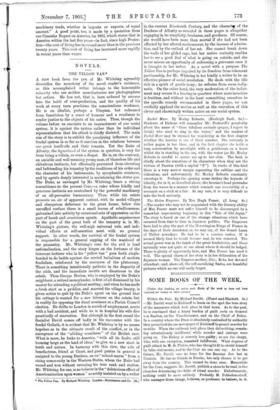NO THE YELLOW VAN.*
A NEW book from the pen of Mr. Whiteing agreeably diversifies the monotony of the novel - reader's existence, as this accomplished writer belongs to the honourable minority who are neither manufacturers nor photographers but artists. He has not, that is, been seduced by success into the habit of over-production, and the quality of his work at every turn proclaims the conscientious workman. He is an idealist, perhaps a Utopian, but redeemed from fanaticism by a sense of humour and a readiness to render justice to the objects of his satire. Thus, though the volume before us amounts to an impeachment of our social system, it is against the system rather than its individual representatives that his attack is chiefly directed. The main aim of the story is to exhibit the paralysing influence of the feudal system in so far as it survives in the relations between our great landlords and their tenants. Yet the Duke of Allonby, the figurehead of the system in question, is very far from being a villain, or even a despot. He is, on the contrary, an amiable and well-meaning young man, of blameless life and chivalrous instincts, but effectually prevented from elevating and befriending his tenantry by the traditions of his order and the character of his instruments, by sycophantic retainers, and by agents deeply interested in maintaining the statue quo. The Duke, as envisaged by Mr. Whiteing, -bears a strong resemblance to the present Czar,—a ruler whose kindly and generous instincts are neutralised by the powerful machinery of an all-pervasive bureaucracy. Thus, while his estate presents an air of apparent content, with its model villages and obsequious deference to the great house, below this unruffled surface there is a small leaven of rebelliousness, galvanised into activity by occasional acts of oppression on the part of harsh and avaricious agents. Apathetic acquiescence on the part of the great bulk of the tenantry is, in Mr. Whiteing's picture, the well-nigh universal rule, and indi- vidual efforts at self-assertion meet with no general support. In other words, the survival of the feudal system is responsible for a general sapping of the manhood of the peasantry. Mr. Whiteing's cure for the evil is land nationalisation, and the story hinges on the fortunes of the itinerant lecturer who in his "yellow van" goes forth single- handed to do battle against the serried battalions of modern feudalism, reinforced by the resources of the plutocracy. There is something intentionally pathetic in the disparity of the odds, and the immediate results are disastrous to the rebels. Thus George Herion, who is employed by the Duke's neighbour, a retired moneylender, is first of all dismissed by his master for attending a political meeting ; and when he has made a fresh start as a peddler, and married the village beauty, is given notice to quit by the Duke's agent on the ground that his cottage is wanted for a new labourer on the estate, but in reality for opposing the ducal nominees at a Parish Council election. He drifts to London in search of employment, meets with a bad accident, and while he is in hospital his wife dies practically of starvation. But although in the first round the Socialist David comes off badly in his encounter with the feudal Goliath, it is evident that Mr. Whiteing is by no means hopeless as to the ultimate result of the conflict, or in the emergence of the "abiding soundness" of the British race. What is more, he looks to America, "with all its faults still looming large as the land of ideas," to give us a new start in truth and nature. In harmony with this view, the role of benefactress, friend at Court, and good. genius in general is assigned to the young Duchess, an ex-" school-marm" from a rising community in the Western States, whom the Duke had wooed and -won without revealing his true rank and station. Mr. Whiteing, for one, is no believer in the "deleterious effect of Americanisation upon woman" so acidly insisted on by a writer
• The Yellow Van. By Richard Whiteing. London ; Hutchinson and Co. Do.]
in the current Nineteenth Century, and the character. of the Duchess of Allonby as revealed in these pages is altogether engaging in its simplicity, freshness, and goodness. Of course, she would have been more than mortal if she had not been affected by her altered environment, by the incense of admira- tion, and by the outlook of her set. She cannot break down the walls of her gilded cage, but her native curiosity enables her to see a good deal of what is going on outside, and she never misses an opportunity of redressing a grievance once it is brought to her notice. As a novel with a purpose The Yellow Van is perhaps impaired by its freedom from vehement partisanship, for Mr. Whiteing is too kindly a writer to be an effective pioneer of social revolution. He deals with the idle rich in a spirit of gentle irony; he refrains from saeva inclig- natio. On the other hand, the very moderation of the indict- ment may secure it a hearing in quarters where mere invective is fruitless, and without in the least committing ourselves to the specific remedy recommended in these pages, we can cordially applaud the motive as well as the execution of this clever and charmingly written satire on our social system.






























































 Previous page
Previous page